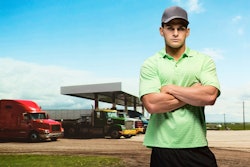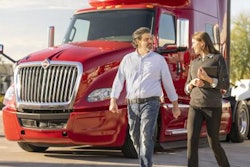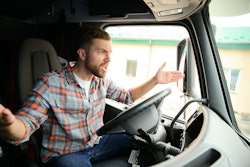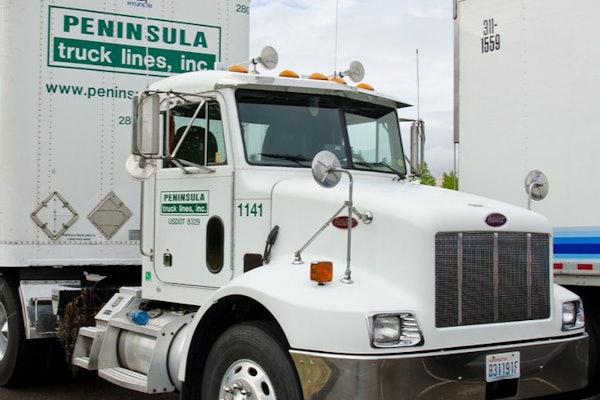With cargo theft on the rise, there are things fleets can do to lower the chances that they are targeted.
If you missed last week’s episode of the 10-44, we talked with Scott Cornell, transportation lead and crime and theft specialist at Travelers, about the recent rise in cargo theft and trends in that space. This week, we continue our conversation with Cornell about how fleets can protect themselves.
Contents of this video
00:00 10-44 intro
00:29 Cargo theft, part 2
00:55 Warehouses, processing procedures
02:24 Security and cameras
04:21 Hard locking devices
05:18 Tracking devices for trailers and cargo
07:25 Fleet tips for drivers
08:09 Using a “red zone”
08:56 Tips for over-the-road cargo security
11:58 Trends in cargo theft
13:00 Organizations and resources for fleets
Jason Cannon:
This week's 10-44 is brought to you by Chevron Delo, 600 ADF ultra low ash diesel engine oil. It's time to kick some ash. With cargo theft on the rise, what can fleets do to lower the chances that they're targeted? You're watching CCJ's 10-44, a weekly webisode that brings you the latest trucking industry news and updates from the editors of CCJ. Don't forget to subscribe and hit the bell for notifications so you'll never miss an installment of 10-44.
Hey everybody, welcome back. I'm Jason Cannon and my cohost on the other side is Matt Cole. If you missed last week's episode, we talked with Scott Cornell, transportation lead and crime and theft specialist at Travelers. And he talked about the recent rise in cargo theft and trends in that space. Now this week, we continue that conversation with Scott, but it's about how fleets can protect themselves.
Matt Cole:
For larger fleets with warehouses and cross docks, there are a number of ways to mitigate the risk of theft at these locations.
Scott Cornell:
So if we start with the warehouses, we take the same general approach with all of our clients, so our team that does the investigations, we also work on the prevention side. We work as consultants for our clients, teach them how to prevent cargo theft. And we take the same approach with all our clients. It doesn't matter what part of the supply chain they work in. And that approach is a layered approach. We always start that layered approach with good process and procedures. It's important to have those things in place first because if you go out and you spend money on, let's say locks or technology tracking devices, things like that, but you don't have good process and procedures in place on how you're going to implement them, you're not really making the best investment. You may not get the best use out of the investment that you're making. So we start with that good process and procedure.
So what would that involve if we're talking about a warehouse? Strong control of your ingress and egress. You should know everybody who's coming in and out of your lot. You should verify everybody who's coming in and out of your lot. Now, some do it at the dock itself. When I make the recommendation, I make a recommendation that you're controlling the entry to the yard, not just who pulls up to the dock, but who's coming into the yard. Because if there's free flow in and out of the yard, even if you're controlling it well at the dock, people will take access to that yard and gather intel. If you're working with your loading docks open, it's not hard for the bad guys to drive through in a car or drive through in a bobtail and see what's inside the dock, what's inside that door. Oh, there are electronics, or it's food and beverage, or it's clothing or whatever it is. So they'll use that to gather intel. So I would encourage you to control who has ingress and egress to the lot.
And verify who's supposed to be coming in that day. You should know who the pickups or the deliveries are. And make sure that there's security guard there at that point of entry that can verify, yes, you're supposed to be here, no, you're not supposed to be here. And then reverify at the dock. Just make sure that everything checks out, the same paperwork, all the same information, reverify that at the dock. We encourage people to have cameras at the dock, cameras at the entrance. If you have cameras at the entrance, that's going to capture any lettering, any wording, any identifiers on the side of the tractor and the trailer, the MC DOT numbers on the side of the tractor and the trailer, any specific... You'd be surprised, something like a dent or a scrape or a scratch down the side is going to help law enforcement if they needed to figure out, hey, which red tractor is this? Well, hey, there's a bunch of them parked in this lot, but we're looking for one that has a big dent down the side, or a scrape down the side or something like that. And then the logos and the identifiers all come into play for that. But capture all that information when they're coming into the lot.
You're knowing what they're coming into the lot for, what load they're coming into the lot for. Check that paperwork as they leave too. Don't just let them pull out because they got it. Let's make sure they're leaving with the right stuff. But having cameras at the dock as well, that can capture the loading, unloading, making sure. And that goes beyond security. It's good for you to show that everything was loaded undamaged, it was loaded correctly, it was secured in the back of the trailer correctly. That helps you in a lot of other ways, not just security.
If you are a warehouse that stages loads or has loaded trailers in the lot, people are going to come hook to those, this is where we get into the next layer, which is what we talk about is hard locking devices. If you have to stage loads in those lots overnight, or you want to make sure who's hooking to the trailers that are preloaded, you should have landing gear locks on those so that somebody has to come to you, "Hey, I can't hook this trailer until you get the landing gear locks off." "Okay, well, let's verify that you're the right person and you're hooking to the right trailer." Sometimes it's just a mistake. Sometimes they just mistakenly hook to the right trailer even if we're getting beyond cargo theft. So this helps, again, in other layers of what you're trying to do and how you're trying to be efficient in your daily operations, not just by preventing cargo theft. So now you're securing those trailers, secure the rear doors together with high security rear door locks so that at night people can't pilfer, people can't shop the loads, people can't get into those. So now if you're immobilizing that trailer with landing gear locks and high security rear door locks, you have that hard security on it beyond controlling the ingress and egress.
And then the third layer we always talk about is technology. And I did talk a little bit about technology with cameras at the entrance and the loading docks and things like that. But do you have the ability to put tracking in the trailers? Do you have ability to put tracking in the cargo? And then are you fully utilizing those tracking devices? Meaning a lot of them have route fencing, geo-fencing capabilities. If you have to leave loads staged in the lot, even if you use a slap and track, meaning a magnetic one that mounts to the bottom until you give up that trailer to somebody to pick up, you can have notification on that if somebody's trying to leave the lot with it before it's been freed to go. Those are high level. There's several more aspects to it. We get in a lot more detail with our clients. But that gives you some high level examples. But we really take that layer approach as we work with.
Jason Cannon:
Scott also has plenty of suggestions for fleets to give for their drivers who are actually transporting all that cargo. We're going to hear what those are after this word from 10-44 sponsor Chevron Lubricants.
Protecting your diesel engine and its aftertreatment system has traditionally been a double-edged sword. The same engine oil that is so essential to protecting your engine's internal parts is also responsible for 90% of the ash that is clogging up your DPF and upping your fuel and maintenance costs. Outdated industry thinking still sees a trade-off between engine and emission system protection, and Chevron was tired of it. So they spent a decade of R&D developing a no-compromise formulation. Chevron Lubricants developed a new ultra low ash diesel engine oil that is specifically designed to combat DPF ash clogging. Delo 600 ADF with omnimax technology cuts sulfate ash by whopping 60%, which reduces the rate of DPF clogging and extends DPF service life by two and a half times. And just think what you can do with all the MPGs you're going to add from cutting your number of re-gens. But Delo 600 ADF isn't just about aftertreatment. It provides complete protection, extending drain intervals by preventing oil breakdown. Before you had to choose between protecting your engine or your aftertreatment system, and now you don't. 600 ADF from Delo with omnimax technology, it's time to kick some ash.
Scott Cornell:
Well, I would start with this conversation about the pickup. So one of the big things that we know about is the bad guys sit surveillance outside the distribution centers, and they want to follow those trucks away from the distribution centers. So if I'm a driver, and I'm aware of these cargo theft problems, and that's one thing when we talk about process and procedures, we always encourage our clients to make the drivers aware of the problem. If you're having a driver pickup a load of electronics in Southern California right now, make the driver aware, share a cargo net report with them, share a regional cargo net report or a bulletin from cargo net. I find drivers are a great first line of defense. They take a lot of responsibility for it. They feel a sense of entrustment with the load. They don't want to be stolen from. They don't make good victims. So if you make them aware, and then you tell them, "Hey, let's use a red zone, meaning before you pick up that load, let's get your fuel, let's take your break, let's have your meal, use the facilities, the driver lounge, the showers, whatever you have to do before you pick up that load so that once you pick up that load, you're prepared to drive for 150 to 200 miles without stopping."
Now, does that eliminate being followed all the time? No. There are exceptions, and we've seen some of those exceptions, like the loads that are being followed in Arizona and things like that. But 60 to 70% of the time, that's going to eliminate the average cargo thief that wants to follow you to the nearest truck stop from the point of pickup, 10, 15, 20 miles, hoping that you're going to go, now loaded, get your fuel, get your meal, take your rest, use the shower so they have time to steal from you or steal your load.
Now, if you do have to stop, you're over the road for multiple days, we would encourage you to use hard locking devices. First of all, park in well lit areas, secure lots if you can find them. If you have your own company secure lot along the route, choose that over the truck stop. Truck stops, unfortunately, get targeted by cargo theft rings a lot of times. So if you have that option, choose that option. But if you're going to a truck stop, you're going to be in, you're going to be taking your break, first of all, to prevent pilferage, secure those two rear doors together. Use a high security rear door lock, make sure that those left and right doors are married together so that they can't pilfer for you while you're sleeping in the cab. We see that. People are like, "How did the driver sleep through that?" We see how big the trucks are. We see how noisy the truck stops are. And they have become accustomed to sleeping in that noise and with the rumbling of the truck or the movement of the truck and the weather and everything like that. So they're not going to wake up for somebody who's careful about opening those rear doors and things like that. So let's secure those two rear doors together so that they can't be pilfered while they're parked.
But if you're going to leave the tractor and trailer, use some good air cuff locks. Put those air cuff locks on there, good quality ones, you kind of get what you pay for. Make sure you're using some good quality ones there. Enforcer makes a good one. We work with Transport Security a lot. They make a good air cuff lock. And that's going to make it tough for them to disengage the air brakes and move with your tractor and trailer. Now, can they beaten? I always say there's nothing that can't be beaten at some point. But there's a good chance that they're going to end up damaging the air cuff switches for that and then not going to be able to move it anyway. And now, do you end up with a repair? Sure, you end up with a repair, but it's a lot cheaper than losing an entire load. You can still use landing gear locks. Even if you're parked, you can still drop the landing gear and put landing gear locks on there and make it tougher for somebody to steal. But try and immobilize that tractor and trailer.
And then getting into that third layer, do you have tracking? If you or your company has tracking in there, let's say you work for a trucking company that has multiple tractors and trailers, multiple drivers, and they have tracking and all this. Can you set up some kind of a communication check-in/checkout process with dispatch, "Hey, I'm going to be at the truck stop for the next six hours." "Okay, well, we're going to put a geo-fence around your tracking device for six hours. If it leaves before six hours, dispatch is going to get a notification." Then you can check with the driver, "Hey, are you in the truck?" "Oh, yeah, sorry. I left a half an hour early. My bad." Or," I had to move to a different truck stop because this one's too packed." "Okay, I'll drop that geo-fence." Maybe you have some miscommunication, but you don't have a theft. If you do have a theft, "Hey, no, I'm not in the cab. I'm inside the truck stop. My truck shouldn't be driving," well, now we can get a response going right away.
Matt Cole:
While it's important for fleets to know the trends in cargo theft activity, Scott says it's also important that carriers always be mindful of theft, regardless of where they're operating or what they're hauling.
Scott Cornell:
With the trends, you can look at the reports and you're going to see what's most commonly stolen, food and beverage, electronics, household goods, don't lock in on that. In California, we've seen several loads of solar panels stolen. Now, solar panels aren't necessarily on the list, or they may be included in electronics. But you may think, "Oh, who's going to steal loads of solar panels?" There's been multiple loads of solar panels stolen. So don't lock in on the reports. Don't lock in on that, "Well, I don't haul in the top three, I don't haul these top five commodities." It doesn't matter. They'll still steal it. They're going to have a market. There's very few things that they can't figure out how to move somewhere. And listen, we've seen them steal things in the past where the client calls and you go, "They probably didn't know that that's what they were stealing, and that's probably going to show up because they won't know what to do with that." That's rare. They can usually figure out what to do with that, what to do with any freight that they steal. And they're much better at targeting the right commodities now, especially with the strategic theft increases.
Jason Cannon:
Scott also encourages fleets to get involved in groups like the Transported Asset Protection Association and Regional Security Councils.
Scott Cornell:
The public service announcement I'll make is this, you need to get involved, everybody needs to get involved at this point. Join organizations like TAPA. Use resources like Cargo Net, things like that where you can get the reports. Overhaul is another company that is a resource out there. Companies like that, we have relationships with them for our clients. We encourage our clients to participate in those. I sit on the board for TAPA. TAPA is a nonprofit organization that sets industry standards for supply chain security. They have two great conferences every year. Go to those conferences, network. You're going to meet taskforce members. You're going to meet other people in the public sector. We're hosting our conference in California, October 25th and 26th in California, and we have record attendance already set this year. So there's going to be a bunch of experts there, networking, teaching, training, taskforce members, meeting with public employees, things like that, that are dealing with these problems. You need to network. You need to participate.
We've recently had a relationship with Trucker Path, which is an app out there for drivers. And we've put a theft response, theft reporting feature in Trucker Path for our clients that makes reporting cargo theft easier. Use these resources that are available out there. That's a free resource. So find those free resources. Whether you're with us or you're with somebody else, I'm not trying to market. If you are with somebody else, find out what free resources they have that you can take advantage of.
And then this last part, you have to have a response. Cargo theft doesn't happen 9:00 to 5:00 Monday through Friday. It happens at 2:00 AM Friday morning in the middle of nowhere. And you need to know who's going to pick up the phone for you at 2:00 in the morning. And networking is part of that. Going to these conferences or joining regional security councils like the Southwest Transportation Security Council, things like that, the Pharmaceutical Supply Chain Security Council, get involved in those so that you have resources, somebody that will pick up the phone for you at 2:00 AM when you have a theft and get the wheels spinning, no pun intended, get that response going for you.
Test your team on that. Do a dry run. "Hey, today we're going to do a tabletop exercise and pretend," Chuck Forsyth always talks about this, "We're going to do a tabletop exercise, and we're going to pretend that we had a theft, and we're going to see how everybody on the team responds to it. Does everybody who's supposed to pick up the phone at 2:00 in the morning pick up the phone? Do we reach out to the right resources? Did we have the phone numbers for the right resources? Did we know who we were supposed to know?" You have to have that response in place at this point. You can't go without it because if you have that theft, and when you look at the rate of theft right now, unfortunately, the chances are pretty strong that you might have a theft, you really need to know how to react to that.
Jason Cannon:
That's it for this week's 10-44. You can read more on ccjdigital.com. While you're there, sign up for our newsletter and stay up to date on the latest in trucking industry news and trends. If you have any questions or feedback, please let us know in the comments below. Don't forget to subscribe and hit the bell for notifications so you can catch us again next week.









